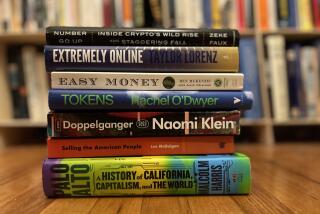A summer reading list from top business leaders
- Share via
On the list of recommended summer reads that Microsoft founder and Chief Executive Bill Gates recently posted to his personal blog, not one is a business book.
The tech titan and philanthropist spent decades building one of America’s biggest corporations, which makes it notable that his shared summer reading list is hardly made up of business bestsellers. Rather, it includes books on topics like vaccines (“On Immunity”) and carnivorous diets (“Should We Eat Meat?”). Other books also tackle scientific questions, from the serious and profound (“The Magic of Reality”) to the absurd (“What If?”). Gates even includes a book from the popular blogger and humorist Allie Brosh (“Hyperbole and a Half”).
Whether it’s biography, history, nonfiction or spirituality, it’s not uncommon to hear executives recommend non-business books. Jack Dorsey, one of Twitter’s founders and the current CEO of Square, gave all of his employees a copy of Atul Gawande’s “The Checklist Manifesto.” Goldman Sachs CEO Lloyd Blankfein has said he recently read “Dead Wake,” Erik Larson’s bestseller on the Lusitania.
Andresseen Horowitz co-founder Ben Horowitz recommends:
Horowitz told me last year that one of the most inspirational books he’s read is “The Black Jacobins” by C.L.R. James. It’s about Toussaint L’Ouverture, the leader of the most successful slave revolution in history. “He would capture English and Spanish soldiers and make them part of his army, which is amazing — as is how he thought about adopting the best parts of their culture into his culture,” Horowitz told me. “If you could read one book on leadership, that would be the one I would pick.”
Microsoft CEO Satya Nadella recommends:
In a memo to employees after becoming CEO early last year, Nadella recommended “The Boys in the Boat” by Daniel James Brown, about the 1936 U.S. Olympic crew team. He quotes a passage from the book about what the author calls “the swing of the boat,” in which the team of rowers are working in “such perfect unison that no single action by any one is out of synch with those of all the others.” Nadella wrote that “as a company, as a leadership team, as individuals, that is our goal — to find our swing.”
Container Store CEO Kip Tindell recommends:
In an interview I did with him last year, Tindell recommended “I Believe in Zero” by Caryl Stern, the CEO of the U.S. Fund for Unicef and a friend of Tindell’s. Its premise — that the world has the power to reduce the number of preventable deaths of young children to zero — is the epitome of leadership, Tindell said. “Most limits are self-imposed,” Tindell said. “That’s what leadership is all about: getting somebody to see your vision and believe it’s possible.”
Gates Foundation CEO Sue Desmond-Hellman recommends:
Desmond-Hellman, a former Genentech executive and former chancellor of UC San Francisco, told On Leadership that “Lincoln” by David Herbert Donald was a favorite. “It demonstrates how Abraham Lincoln, a man from humble beginnings who had many flaws (I can relate!),” she wrote in an email, “can grow and develop into a great leader who is able to tap into the best in others and lead our country in an extraordinary way.”
Former Campbell Soup CEO Doug Conant recommends:
Conant said that one of his favorite books is “The Road Less Traveled.” He wrote that while the subject of spiritual growth is often avoided by leaders, they need to embrace it to really grow. “Scott Peck’s work arrived in my life at a time when I was particularly open to the pursuit of spiritual growth. And his thinking around leveraging discipline and love in pursuit of that growth was extraordinarily helpful.”
Google Senior Vice President of People Operations Laszlo Bock recommends:
Bock told me that “Impro” by Keith Johnstone is a “fantastic leadership book.” The author, who teaches improvisational theater, discusses how people who struggled getting into character are transformed by simply putting on a mask. “The leadership insight is that if you’re stepping into a leadership role — or anything you’re uncomfortable with — you have to imagine you’re playing this role.” Bock said he’s shared the book with other people, “and they’ve come back and said, ‘Wow, this really freed me up to make my voice heard.’ ”
Jena McGregor writes a daily column analyzing leadership in the news for the Washington Post’s On Leadership section.
More to Read
Inside the business of entertainment
The Wide Shot brings you news, analysis and insights on everything from streaming wars to production — and what it all means for the future.
You may occasionally receive promotional content from the Los Angeles Times.










